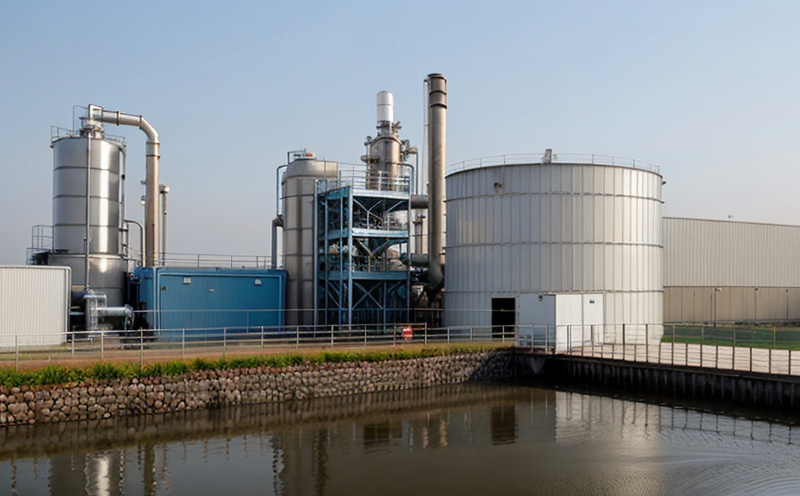DIN 38402 Sampling Testing for Wastewater Facilities
In industrial manufacturing and processing facilities, wastewater management is a critical aspect of maintaining operational efficiency while ensuring compliance with environmental regulations. DIN 38402:1996, Sampling of Liquid Materials in Pipelines, provides standardized procedures for sampling wastewater to ensure accurate analysis and reliable data. This service ensures that the samples taken are representative of the overall wastewater stream, thereby supporting effective decision-making processes within your facility.
The DIN 38402 standard outlines a systematic approach to wastewater sampling, which includes selecting appropriate sampling points, using suitable sampling equipment, and adhering to specific guidelines for sample collection. By following these protocols, industrial facilities can ensure that the samples collected are representative of the wastewater being analyzed. This is crucial for accurate testing results, which in turn inform critical operational decisions such as process optimization and compliance with environmental standards.
Water quality testing plays a pivotal role in various stages of industrial manufacturing processes. From raw material selection to final product release, water quality directly impacts production efficiency and the overall sustainability of operations. Accurate sampling is fundamental to ensuring that all test results are valid and reliable. DIN 38402 provides clear instructions on how to collect representative samples under different flow conditions, which ensures consistent and repeatable testing outcomes.
The standard specifies detailed procedures for various types of industrial wastewater, including but not limited to cooling water systems, boiler feedwater, and process waters used in chemical synthesis. By adhering to DIN 38402 guidelines, industrial facilities can ensure that their sampling practices are consistent with international standards, thereby enhancing trust among stakeholders.
Compliance with environmental regulations is paramount for maintaining a sustainable business model. DIN 38402 supports this goal by providing robust methods for wastewater sampling, which helps industrial plants meet regulatory requirements. This standard ensures that samples taken are representative of the wastewater stream, making it easier to demonstrate compliance during audits or inspections.
Representative sampling is essential for obtaining accurate results when analyzing wastewater quality parameters such as pH levels, dissolved oxygen content, and biochemical oxygen demand (BOD). By following DIN 38402 guidelines, industrial facilities can ensure that their sample collection processes are efficient and effective. This leads to more precise testing outcomes, which in turn contribute to better-informed management decisions.
Furthermore, adhering to DIN 38402 promotes best practices in wastewater management by encouraging the use of appropriate equipment and techniques for sampling different types of industrial wastewater. This not only enhances accuracy but also ensures that samples are collected safely and efficiently, minimizing risks associated with handling hazardous materials.
Applied Standards
| Standard Name | Description |
|---|---|
| DIN 38402:1996 | Sampling of Liquid Materials in Pipelines |
| ISO 7859-1 | Pipelines—Sampling of liquid materials |
| ASTM D4459 | Sampling of Liquid Materials in Pipelines |
Environmental and Sustainability Contributions
DIN 38402 sampling testing for wastewater facilities plays a vital role in promoting environmental sustainability within industrial manufacturing processes. By ensuring that samples are representative of the overall wastewater stream, this service supports accurate analysis and reliable data collection, which is essential for making informed decisions regarding process optimization and regulatory compliance.
Accurate wastewater sampling helps industrial facilities meet stringent environmental regulations, thereby reducing their ecological footprint. This not only enhances corporate social responsibility but also fosters a positive public image. Compliance with environmental standards through representative sampling ensures that any necessary corrective actions can be implemented promptly, further contributing to sustainability efforts.
In addition, adhering to DIN 38402 guidelines encourages the use of appropriate equipment and techniques for collecting samples from various industrial wastewater streams. This promotes best practices in wastewater management by ensuring safety, efficiency, and accuracy during sample collection. By minimizing risks associated with handling hazardous materials, this approach also supports worker safety and health.
Ultimately, DIN 38402 sampling testing contributes significantly to the overall environmental sustainability of industrial manufacturing processes. It ensures that all test results are valid and reliable, supporting better-informed management decisions and fostering a culture of continuous improvement in waste reduction and resource efficiency.
Competitive Advantage and Market Impact
- Ensures accurate and representative wastewater samples for analysis
- Supports compliance with environmental regulations, enhancing corporate reputation
- Promotes best practices in wastewater management through appropriate equipment and techniques
- Maintains worker safety and health by minimizing risks associated with hazardous material handling
- Fosters a culture of continuous improvement in waste reduction and resource efficiency
- Enhances decision-making processes for process optimization and regulatory compliance
- Supports accurate testing outcomes, leading to better-informed management decisions





